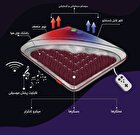Islamic Azad University Student Invents Device to Measure Executive Functioning of Brain

Kamran Meyhami, a psychology student at Islamic Azad University’s Kermanshah branch, has received a patent certificate for his invention and an Inv certificate from the International Federation of Inventors' Associations (IFIA) in Switzerland. He also is a member of the Iranian-American Psychological Association (APA).
“The main goal behind this invention was to make a device for measuring memory, learning, and the executive functioning of the brain, increasing the ability to plan, organize and solve problems and strengthening manual skills for children and adults,” Meyhami told ANA.
He explained that the main application of the device is in the field of psychology in rehabilitation centers, clinics, counseling and psychotherapy centers, kindergartens, centers for determining the level of learning, educational centers, psychiatrists, neuropsychiatric hospitals, schools and generally for use by all ages.
In a relevant development earlier this month, an Iranian researcher at Tarbiat Modarres University presented a treatment protocol for rehabilitation and language development of children with autism.
In Persian language, therapeutic programs and assessment tools in the field of abstract and metaphorical concepts for children with autism disorder are very limited.
For this reason, Mehdi Madani Fard, a PhD student at Tarbiat Modarres University in Tehran, took a step towards rehabilitation and linguistic development of Persian-speaking children with autism in the form of his specialized doctoral thesis in the field of ‘Cognitive Sciences-Linguistics’ by presenting a treatment protocol.
The thesis investigated understanding of Embodied Conceptual Metaphors in two groups of children with autism and normal children in four stages by using two types of visual and auditory tests.
Then, by designing a strengtheing program, including five sets, the abstract concept of metaphor was taught in 20 sessions, and the study investigated the effect of this program on understanding of physical conceptual metaphors in 7-12-year-old Persian-speaking boys with mild autism.
One of the most significant achievements of this research was finding a way to strengthen the understanding of embodied metaphors and generally strengthen abstract thinking in children with autism. In fact, this program can leave positive effects on the language and communication performance of these children.
4155/v
























